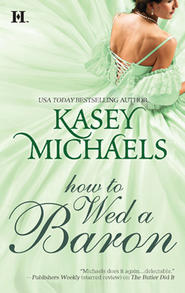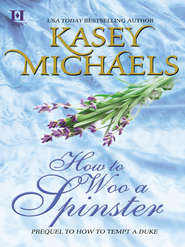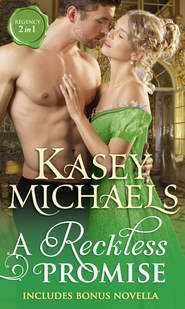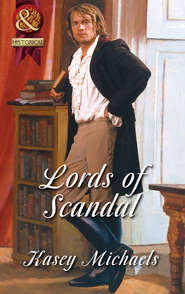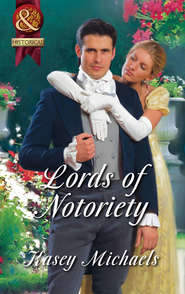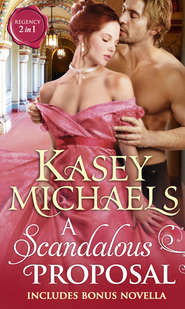По всем вопросам обращайтесь на: info@litportal.ru
(©) 2003-2024.
✖
How to Tempt a Duke
Настройки чтения
Размер шрифта
Высота строк
Поля
Grandchildren? That’s when Rafe had narrowed his intense brown eyes and demanded his friend find them a place where they could both, with any luck, soon render themselves grandly drunk.
Rafe shivered now in his damp uniform and shifted his chair closer to the mediocre fire burning in the hearth of the tavern Fitz had chosen for them. He ran a hand through his overlong, self-barbered black hair, feeling the grease and grit that he had begun to doubt he’d ever be able to wash out of it, and then rubbed at the stubble on his chin. He’d have to locate a new razor in order to shave before presenting himself at Headquarters the next morning, and a clean shirt, as well. Just a dry shirt would do.
“Well now, would you look at that,” Fitz said with a grin. “Huddling by the fire like some old maid who’s never known a warmed bed. Would you be wanting a blanket for around your shoulders, Mistress Daughtry?”
“Stubble it, Fitz,” Rafe grumbled, suppressing another shiver. Sometimes he wondered if he’d ever be warm again. “Where’s this fine ale you told me about?”
“So many complaints from a man more used to sleeping in ditches these past years. And the devil with the ale—where’s the willing mam’zelles?” Fitz pushed himself out of his chair and grabbed on to the innkeeper as he passed by their table. “Parle vous the English, mon-sewer?”
The fat and rather greasy innkeeper rolled his eyes as he rattled off a quick string of French that had Rafe laughing into his fist, especially the part where the man compared Fitz to a hairy, overgrown cockroach.
“Two mugs of your finest brew, Innkeeper, if you please, and whatever hot food you’ve got in the kitchens,” Rafe interjected quickly in flawless French as he tossed the fellow a coin, and the man bowed his way back to the bar.
“Damned frogs. They don’t seem to know we’ve beaten them, do they, Rafe?”
“Oh, they know, and they hate us for it. The only thing saving us right now, I’d say, is the fact that most Parisians blame Bonaparte for getting them into this fix in the first place. I heard we had to put more guards around his quarters again today to protect him from his own once-loyal subjects. A part of me thinks we ought to stand down, and simply let them have at him. A personal escort of one thousand of his own men, armed, and in uniform? Dubbing him bloody Emperor of Elba? This is what we fought for, Fitz?”
“Does seem like we’re coddling the little fellow, I agree. How long are you and I supposed to be guarding him, anyway? Not that I’m in any great rush to head back to Dublin. Wet and cold it may be right now, but Paris has Dublin beat all hollow for willing females.”
“That’s only because all the females in Dublin already know you and make sure to stay away.”
“True enough,” Fitz said, scratching at his neatly trimmed beard, his green eyes sparkling. “I have cut myself a bit of a swath through the local ladies, handsome devil that I am. Now answer my question, if you please.”
Rafe drank deep from his mug as the barmaid plunked down two bowls of steaming stew and then winked at him before walking away, her pretty, rounded rump issuing a provocative invitation he felt oddly disinclined to accept. Still, if he paid her well enough, she might launder his shirt for him while he took a nap.
“How long? Six months or more, according to our orders,” he said as he lifted a stained wooden spoon and prodded at the thick stew, knowing he should just close his eyes as he ate, and not ask himself if he could identify the meat. “I hope I can find an opportunity to talk to the man.”
Fitz looked at him, eyebrows raised. “Talk to Boney? Why would you be wanting to do any such thing?”
Rafe crossed his arms and tried to hug some warmth into his bones before tackling the stew. “I don’t know why I’m telling you, since you’ll do nothing but make jokes at my expense, but I’ve been toying with the idea of penning a book about the war. You do realize, don’t you, Fitz, that for all our years with Wellington, we never once encountered Bonaparte himself across the battlefield.”
“And we never want to, to my mind. So you’re setting yourself up as another Byron, is it?”
“Hardly. That would mean casting myself in the role of hero. Just a simple history, Fitz, one that nobody will read, not even those grandchildren you’re trying to foist onto me. At any rate, we’ll be back in England by Christmas, if you’re still of a mind to accept my invitation to visit for a few months.”
“I am. I’ve heard enough about your home to think I already know it, but I still want to meet this grand family you say you have, not that I’ve seen a letter from any of them in all the years I’ve known you. Or you penning more than the occasional note to any of them, come to think of it. And what then for you, Rafe?” Fitz asked as they ate. “Will your uncle the duke let you take back the reins on your imaginary estate?”
Rafe put down his spoon, his only mediocre appetite now completely gone. “I’ve never held the reins, Fitz, and you know it. Mother’s succession of husbands did that, each one a worse steward than the last. At least they listened to my mother and refused all of His Grace’s offers to put one of his own men in charge.”
“Why would they do that?”
“Because my uncle would have offered his hand, and then taken back twice as much with both hands. That, and my mother loathes the duke.”
“But the estate is yours, correct? You left England a lad, but you return having gained your majority.”
“In a perfect world that might be so,” Rafe said, rubbing at his eyelids, which seemed to wish to close even as he struggled to keep them open. “But, thanks to Willowbrook not being part of any entail, everything is under the control of my mother until I reach the age of thirty.” He reached for his mug of ale once more. “And my mother? Does she play the good steward of her son’s eventual inheritance? No, she does not. She marries, Fitz. It’s what she does.”
“Maybe she’d like to marry a nice young Irishman, then,” Fitz teased, giving Rafe a jab in the side. “I’d let you run the place to your heart’s content, sonny, while your mother and I—What would we do, Rafe?”
“I wouldn’t even want to contemplate such a question. Besides, she was barely out of her widow’s weeds when I left, so there may be yet another new stepfather installed at Willowbrook for all I know, and my sisters tossed back to the duke for safekeeping while dear Lady Helen plays at blushing bride.”
“Oh, come on now, it wasn’t all so bad, as I recall you telling me you spent most of your years with the duke and his sons yourself, until he bought you your commission. There could be worse fates than a generous uncle.”
“That’s what Charlie used to tell me. Drove me halfway round the bend, that little monster did, but she, like you, did have a point.”
Fitz looked into his mug. “No, I can’t be drunk yet, there’s still too much ale in here. Charlie? And then you said she?”
Rafe smiled at the memory of a girl several years his junior: tall, thin, all long legs and elbows, trailing after him as if he were some knight in shining armor. “Sorry. I should have said Charlotte. Charlotte Seavers. Her father’s estate cuts into my uncle’s, also, like a wedge of pie. Rose Cottage and the land that’s still a part of it are probably more of a thorn in His Grace’s side than Willowbrook.”
“Roses, thorns, that makes sense.”
For some unknown reason, a memory he didn’t know he still possessed rose in Rafe’s head. He was in the apple orchard, hiding from his lessons with his cousins, and Charlie had called down to him from her perch in the branches of one of the trees. He didn’t know how she did it, but she’d always seemed to know where he would be, and made sure that she was there, as well.
Sometimes he was flattered by the young girl’s attention, and sometimes he was annoyed. That day he was annoyed, and to show his annoyance he’d picked up an apple that had fallen to the ground and halfheartedly tossed it in her direction.
It had been a stupid thing to do. He might have hit her with the apple. He might have startled her so that she fell from her perch and was injured.
Instead, the little monster had deftly snagged the apple out of the air with one hand, and then winged it back in his direction.
He’d had that black eye for three weeks.
“Rafe? You’re woolgathering again. I think I said something about there being worse fates than a generous uncle.”
Rafe shook off the memory of his childhood, a move that, oddly, made his head ache even more. “True. But the boy I was at nineteen is not the man I hope I am now, at six and twenty. Grateful as I am, I’m past the point of accepting any more of the man’s cold charity, Fitz. I can’t do anything to help my sisters. I’m thankful for what my uncle has done for them as well as for me, but it’s time I made my own way in the world.”
“Meaning?” his friend asked around a mouthful of stew.
“Meaning, Fitz, that my sisters will be well enough off with my uncle, so I’ve decided to remain in the army. When you get straight down to it, fighting is the only thing I know.”
“This may come as a shock to you, my friend,” Fitz said conspiratorially, taking hold of Rafe’s forearm, “but I very much think we’ve run out of enemies to fight.”
Rafe smiled, as he was sure he was meant to do, and when the barmaid returned with two more mugs of ale, he pulled her down onto his lap and whispered into her ear. She giggled, nodded and instantly began nibbling at the side of his neck while Fitz muttered under his breath that it was always Rafe who had all the luck.
Fitz would think that, and probably with good reason. Rafe knew he’d been fortunate in his uncle in some ways. But he’d be damned if he’d live on the man’s sufferance ever again. Perhaps, when a man didn’t have much to call his own, his pride became all- important.
He also had his sisters to consider, and their futures. The twins had been no more than giggling, pestering children when he’d left for the Peninsula, years younger than Charlie. But they must be all of sixteen by now, and if Rafe knew his mother—and he did—Lady Helen hadn’t given a thought to their futures.
He didn’t know how he’d approach his uncle about Nicole and Lydia, but he hoped that between himself and his aunt Emmaline, the duke could be convinced to add to the small dowries arranged for both of them by their father, and give them a Season in London.
As for what he was to do about his shallow, lovable, spendthrift and woefully flighty mother? Now there was a question fashioned to keep Rafe up nights.
But no matter what, he was done accepting favors for himself from his uncle. He’d spent too many years listening to his bullying cousin George, Earl Storrington, referring to his family as the beggars come to call each time they’d been deposited on the duke’s doorstep, bag and baggage. He’d swallow hard and accept help for his sisters, but not another bent penny for himself. He’d made that vow long ago.
Perhaps playing nursemaid to Bonaparte for these next six or nine months would give him time to formulate a plan for the rest of his life. For so many years, he hadn’t considered much beyond the next day, the next battle, the next search for food and dry lodgings for his men. By silent agreement, neither he nor Fitz had dared to speak of a future beyond that next day, that next battle, or else they might jinx themselves.
Now that the war was won, however, and he had surprisingly found himself still in one piece, he could no longer avoid thinking about that future.
His rambling thoughts made his head hurt. Something was making his head hurt like the very devil…making all of him hurt.






